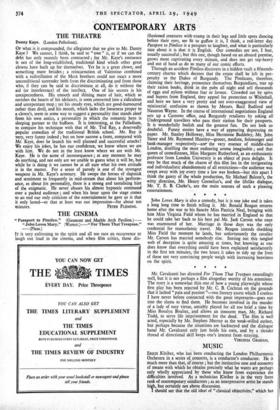CONTEMPORARY ARTS
THE THEATRE
Danny Kaye. (London Palladium).
OF what is it compounded, the allegiance that we give to Mr. Danny Kaye ? We cannot, I think, be said to " owe " it, or if we can the debt has only recently been contracted ; for Mr. Kaye's eminence is not of the long-established, traditional kind which other great clowns have built up for themselves. Yet he is a great clown, and something more besides ā¢ a reincarnation of Valentino combined with a redistillation of the Marx brothers could not exact a more unconditional surrender both from the discriminating and from those who, if they can be said to discriminate at all, do it without the aid (or interference) of the intellect. One of his secrets is his unexpectedness. His smooth and shining mane of hair, which so ravishes the hearts of his idolaters, is soon converted into a ridiculous and unrepentant mop ; ā¢ yet his steady eyes, which are good-humoured rather than droll, and his mouth, which lacks the looseness proper to a clown's, seem in some way to suggest a personality that stands aloof from his own antics, a personality in which the romantic hero is sleeping partner to the buffoon. It is interesting, at the Palladium, to compare his technique with that of Mr. Ted Ray, a deservedly popular comedian of the traditional British school. Mr. Ray is very, very funny indeed ā¢ but on how narrow a front, compared with Mr. Kaye, does he launch his well planned and successful attacks! We enjoy his jokes, he has our confidence, we know where we are with him. We do not in the least know where we are with Mr. Kaye. He is the acme of inconsequence ; at any moment he may do anything, and not only are we unable to guess what it will be, but while he is doing it we cannot be at all sure what his own attitude is in the matter. For a sense of parody is one of the strongest weapons in Mr. Kaye's armoury. He swops the horses of slapstick and sentiment so frequently in mid-stream that about his perform- ance, as about his personality, there is a strong and tantalising hint of the enigmatic. He never abuses his almost hypnotic command over a packed audience ; and when his hour upon the stage comes to an end our only criticism of the entertainment he gave us is that it only lastedāor that at least was our impressionāfor about ten


































 Previous page
Previous page